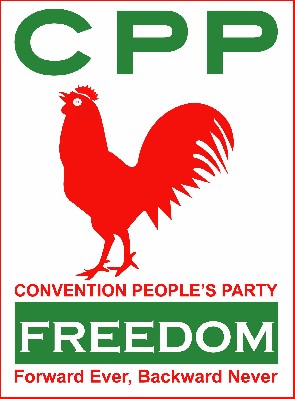- by Admin
- December 21, 2023
Click the link below to join Our WhatsApp group for daily brief on current trends in the country.
Join Here!
Loading

Once the torchbearer of Ghana’s independence and a symbol of hope for a developing nation, the Convention People’s Party (CPP) finds itself at a crossroads, struggling to maintain relevance in the modern political landscape.
Established by Dr. Kwame Nkrumah in 1949, the CPP was pivotal in leading Ghana to independence from British colonial rule on March 6, 1957. However, as the nation approaches her next general elections a presidential candidate, marking a significant shift from its former glory.
The CPP was born out of a fervent desire for self-governance and economic independence. Under the charismatic leadership of Dr Nkrumah, the party galvanized support across the country, championing the cause of “self-government now” against the more gradualist approach of the United Gold Coast Convention (UGCC). Dr Nkrumah’s vision and relentless campaigning resonated with Ghanaians, culminating in the historic declaration of independence and his subsequent appointment as the first Prime Minister and later the first President of Ghana.
During its heydays, the CPP was synonymous with progressive policies, infrastructural development, and a strong stance against neo-colonialism. It was under Dr Nkrumah’s leadership that the Akosombo Dam was constructed. Also, established was the Ghana Atomic Energy Commission, and the founding of numerous educational institutions. These efforts aim at transforming Ghana into a beacon of progress and a leader in the Pan-African movement.
Despite its early achievements, the CPP’s journey has been tumultuous. The party faced significant challenges, including internal strife, economic difficulties, and political opposition. The most significant blow came in 1966 when Dr Nkrumah was overthrown in a military coup while on a state visit to China and North Vietnam. The coup, led by the National Liberation Council, marked the beginning of the CPP’s decline.
In subsequent years the party was grappling with a leadership crises, factionalism, and a diminishing support base. Efforts to revive the CPP have been sporadic and largely unsuccessful, as newer political entities like the New Patriotic Party (NPP) and the National Democratic Congress (NDC) emerged as dominant forces in Ghanaian politics.
Today, the CPP faces an existential crisis. The party’s organizational structure is weak, its leadership lacks the charisma and influence of the Nkrumah era, and its policy platform fails to capture the imagination of contemporary Ghanaian voters. The party’s diminished presence in Parliament and local government further highlights its struggles.
In recent years, the CPP has been unable to field strong presidential candidates, with their performance in elections being largely symbolic rather than competitive. The upcoming general elections underscore this predicament, as the CPP is unlikely to present a viable presidential candidate, raising concerns about its future as a political entity.
The Director of Communications for the Convention People’s Party (CPP), Sylvester Sarpong-Soprano, has disclosed that the party is unlikely to present a presidential candidate for the December polls.
He has cited ongoing internal challenges, including multiple court cases, as the reason for the party’s inability to select a flagbearer.
He underscored the fact that with a few months left to the election, the party is yet to organise and resolve its internal issues making it difficult to field a candidate.
“I am not sure we can present a candidate [for 2024] because of what is occurring in the party. The party persistently has not been able to organise [itself], and this is because of multiple repeated court cases challenging the chairman and leader, unless something dramatic happens within the party [I don’t see how we can field a presidential candidate].”
Justice Siaw Mandela, a political analyst, notes, “The CPP’s decline is a reflection of the changing political dynamics in Ghana. While the party’s historical significance remains unquestionable, it has failed to adapt to the evolving needs and aspirations of the electorate.”
Despite the challenges, some party loyalists remain hopeful. “The CPP’s ideals are still relevant,” says Andrew Blay, a longtime member.
“We need to rebuild from the grassroots, engage the youth, and remind Ghanaians of our foundational principles of social justice and self-reliance.”
In the absence of a presidential candidate, the CPP’s role in the upcoming elections may be minimal, but its contributions to Ghana’s political heritage remain indelible. The question that lingers is whether the CPP can reinvent itself and reclaim its position as a formidable force in Ghanaian politics or whether it will fade into the annals of history as a relic of a bygone era.

Click the link below to join Our WhatsApp group for daily brief on current trends in the country.
Join Here!
0 Comments: